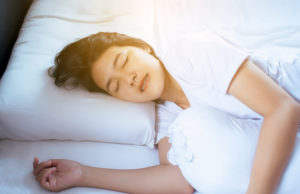
Article at a Glance
- Teeth grinding is also known as bruxism and can be caused by high stress, anxiety, abnormal bites, or sleep disorders.
- Teeth grinding can cause excessive wear and even fractures of your teeth.
- Recurrent, dull headaches or a sore jaw in the morning could be signs you are grinding your teeth at night.
- There are ways to help teeth grinding, but the most common options is using a mouthguard at night.
Whether it’s to keep from screaming at somebody or because you’re under a lot of stress, many people grind their teeth on occasion. For most people, occasional teeth grinding isn’t a problem, but those who grind their pearly whites on a regular basis could end up with problems.
What Causes Teeth Grinding?
Teeth grinding, also known as bruxism, can occur for several reasons. It’s commonly related to high stress or anxiety, but people with abnormal bites, missing or crooked teeth, or a sleep disorder could be affected. Some medications and lifestyle choices, like smoking cigarettes, can cause teeth grinding.
Is Grinding Your Teeth Bad for You?
Occasional teeth grinding does not normally cause significant damage, but it is estimated that 10 to 15 percent of adults are moderate to severe teeth grinders. Moderate to severe teeth grinding can lead to significant problems. Repeated, severe teeth grinding can cause receding gums and lead to tooth loss with the need for bridges, crowns, implants, or dentures. Severe teeth grinding may also impact the jaw leading to TMJ disorders and possibly alter the look of your face.
How Do I Know if I’m Grinding My Teeth?
Since it can occur during the day or night and may or may not be related to stress or anxiety, teeth grinding symptoms may be difficult to catch. You can also ask a family member to observe you for signs of teeth grinding at night.
- Recurrent, dull headaches in the morning, especially around your temples.
- Waking in the morning with a sore jaw.
- Damaged, fractured, or chipped teeth.
- Sensitivity in your teeth.
- Sleep disorders, like snoring and sleep apnea, can cause teeth grinding at night.
How to Treat Teeth Grinding
If you suspect you are grinding your teeth, there are steps you can take to reduce pain and protect your teeth.
- Ice your jaw muscles to alleviate pain.
- Avoid eating hard foods or things that aren’t meant to be food, like pens and pencils.
- Cut back on caffeinated foods and beverages that can increase teeth grinding.
- Take time to relax your facial muscles every day.
- Cut back on alcohol which can cause you to grind your teeth more.
- If your teeth are crooked, try braces to correct the alignment.
- For stress and anxiety related bruxism, learn coping techniques to lower your stress. Figure out what is triggering you to grind your teeth and adopt relaxation exercises to help break the habit.
If you suspect you are grinding your teeth, you should contact your dentist for an evaluation. Your dentist will be able to tell you if you’ve done damage to your teeth and offer treatment solutions, like a teeth grinding mouthguard. There are several options available, so you’ll be able to find the proper fit.
Night guards are the most common treatment for teeth grinding. If your dentist advises you to wear a mouthguard, you can purchase one without a prescription at your local pharmacy, online, or even some grocery stores. They are easy to use and take only a few minutes to prepare. Simply drop the mouthguard in boiling water, remove it and cool it for a few minutes, then gently bite it and form it to your teeth. When selecting an over-the-counter mouthguard, consider the durability, fit, comfort, material (BPA free), and how easy it is to clean.
Your dentist may also offer a custom night guard that would be higher quality and a perfect fit. These are generally more expensive but also professionally, custom made for you, so they’re more comfortable to wear.
Sleep Appliances are useful options for people whose bruxism is caused by a sleep disorder. The oral appliance helps reposition the jaw to keep your airway open while preventing teeth grinding.
If you’re concerned that you’re grinding your teeth and need to be evaluated by a dentist, Jefferson Dental Care can help. Contact the clinic nearest you to make an appointment today!




